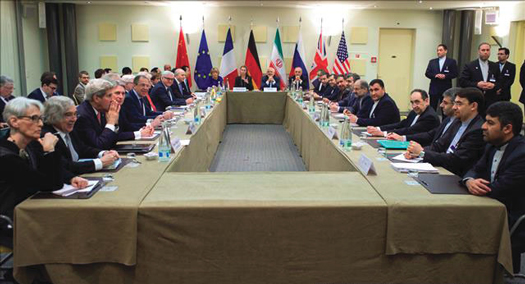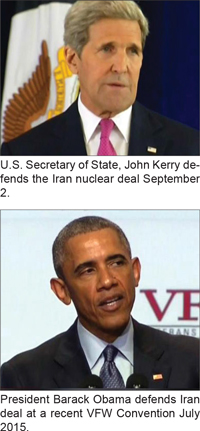Obama nuclear deal with Iran gains support
By Askia Muhammad -Senior Editor- | Last updated: Sep 8, 2015 - 11:50:51 AMWhat's your opinion on this article?

Foreign Ministers negotiating about the Iran Nuclear Deal program. Photos: MGN Online
|
WASHINGTON - President Barack Obama added another notch to his belt of foreign policy victories in early September when the number of U.S. senators supporting the “Joint Comprehensive Plan of Action”—the six nation agreement to limit Iran’s nuclear capabilities in exchange for relief from international sanctions—reached more than enough votes to sustain a veto of any Republican measure of disapproval.
On Sept. 2, the president secured support from Maryland Senator Barbara Mikulski and two others. House and Senate leaders are preparing for a vote this fall on a resolution of disapproval of the deal. It could have the votes to pass both chambers, though in the Senate opponents of the deal would need 60 votes to get past a Democratic filibuster, to even make it to the president’s desk. A veto would require a two-thirds vote in both houses to override it. At Final Call press time 38 senators—out of 100—had expressed support for Mr. Obama’s position.

|
“The fact that they stood up to the pressure from Netanyahu, the fact that the president stood up to pressure from the Saudi king, who’s here now lobbying against the deal, shows (the administration) can stand up to pressure when they want to,” political scientist Dr. Wilmer Leon, host of “On With Leon” heard on Sirius-XM Satellite Radio told The Final Call. “So that begs the question: What’s taken you so long? It’s a great accomplishment, but then again: Why has it taken you so long?”
While some prominent Jewish lawmakers came out in opposition to the agreement, others in and out of Congress expressed strong support. Rep. Debbie Wasserman Schultz (D-Fla.) the chair of the Democratic National Committee announced she would back the deal. Her support is significant because she is Jewish and she represents a Florida district with many Jewish voters who worry about the threat Iran may pose to Israel.
That same day, former Secretary of State Powell—who served as national security advisor to President Ronald Reagan, chairman of the Joint Chiefs of Staff under President George H.W. Bush, in addition to tenure as secretary of state under President George W. Bush—announced his support for the agreement.
“Even if we were to kill this deal, which is not going to happen, it would take effect anyway, because all of these other countries that were in it with us are going to move forward,” Gen. Powell said on “Meet The Press.” Five other nations—Britain, Germany, France, Russia and China—are aligned with the U.S. on the deal, but Israel’s all-out opposition to the pact was only unleashed in the United States.
In fact, some of the most prominent organizations that have been pushing in favor of the deal are Jewish organizations, like Jewish Voice for Peace and the pro-Israel lobby group J Street. Public opinion polls actually show that the majority of Jews in the United States support the deal, according to Medea Benjamin, co-founder of Code Pink Voices for Peace. “So, it’s a good thing that AIPAC has been defeated. It’s a good thing that diplomacy will win the day. We think it’s important though to keep vigilant, because these groups aren’t going away,” Ms. Benjamin told The Final Call.
“We have 100 prominent women who signed on to a letter in support of the nuclear deal, saying how war has traditionally been so destructive to families, leaving women behind to pick up the pieces and try to care for their children, as we’re seeing in Syria today.
“The women who signed include people like Alice Walker and Angela Davis, a number of Hollywood stars, writers. And we also have Sarah Shourd, who was held for over 400 days in Iran by the government,” Ms. Benjamin continued. “She will be coming to say why this deal is good for Iranians, good for Americans, and actually good for the hostages who are still being held in Iran, in fact it will be easier for them to be freed.”
Even as a delegation of rabbis descended on Washington the day Congress reconvened after its August recess, hundreds of other Jewish leaders expressed support for the deal. “Two weeks ago we wrote to you calling attention to a letter signed by Rabbis from around the United States supporting the recently-negotiated nuclear agreement with Iran. The letter was reissued earlier this week because it now has 440 signatories,” Rep. Sander Levin (D-Mich.) and other members of Congress wrote in a letter to their colleagues. “They, like each of us, believe that the Joint Comprehensive Plan of Action is the best way to verifiably prevent Iran from developing a nuclear weapon.”
“As rabbis, we support the agreement between the United States, the United Kingdom, France, Germany, China, Russia and Iran–The Joint Comprehensive Plan of Action,” the rabbis said in their letter. “The Obama administration has successfully brought together the major international powers to confront Iran over its nuclear ambitions. The broad international sanctions moved Iran to enter this historic agreement. Should this agreement be rejected by the U.S. Congress, those sanctions will end. There will be no new negotiations, as the other member countries are fully in favor of this agreement and have no desire to re-negotiate.
“Most especially, we are deeply concerned with the impression that the leadership of the American Jewish community is united in opposition to the agreement. We, along with many other Jewish leaders, fully support this historic nuclear accord,” the 400 rabbis wrote.
If the U.S. was to follow the course laid out by the Israeli government, by Republicans in Congress, and the entire GOP presidential field, the U.S. would “walk out alone,” according to one Democratic lawmaker. “British Ambassador Westmacott has said that sanctions have already reached ‘the high-water mark’ and are likely to erode if this agreement fails,” Rep. Bobby Scott (D-Va.) said in a statement announcing his support. “German Ambassador Peter Wittig has likewise stated ‘if diplomacy fails, then the sanctions regime might unravel.’ And Foreign Policy magazine reported that the Russians have also indicated international sanctions are likely to fall apart if Congress blocks the agreement.
“Without international sanctions, U.S. sanctions alone will be ineffective to prevent the release of Iranian funds because most of those funds are actually held in foreign banks. We will not be able to coerce our international partners to re-impose sanctions if Congress blocks this agreement. China, for example, holds trillions of dollars in U.S. securities, so the idea that we can intimidate their banks is dubious,” said Rep. Scott, who represents a district in the Virginia Tidewater region which includes numerous military installations.
“Insofar as a better deal is not a realistic possibility, I have spent the last several weeks attending classified briefings, reviewing reports from nuclear and non-proliferation experts, and reading the agreement myself. During that time, I have focused not on what should have or could have been in this agreement, but rather on how the agreement compares to where we would be with no agreement at all.
“So if Congress blocks this agreement, we will not have a better deal, Iran will get sanctions relief, and its nuclear program can continue without the restrictions and inspections required under this agreement,” Mr. Scott said.
While the impending victory for the Obama administration is important, it also reveals the frustration many Black observers feel when domestic issues are pushed to the side. “This is a tremendous accomplishment,” said Dr. Leon. “Not only is it a tremendous accomplishment for the country, it’s a tremendous accomplishment for the world. That you can’t take from (President Obama). It also proves, once again that his approach to diplomacy—a longer-term, broader world view in terms of diplomacy, is very, very successful.
“There are so many other issues that were relevant to the African American community. The stance that he’s taken could have accomplished more things for us, instead of their always talking about what they can’t do based upon pushback, what they can’t do based upon the hand that they’ve been dealt, and so many other reasons why they’ve given that they haven’t been more successful on domestic policy,” Dr. Leon said.
INSIDE STORIES AND REVIEWS
-
-
About Harriett ... and the Negro Hollywood Road Show
By Rabiah Muhammad, Guest Columnist » Full Story -
Skepticism greets Jay-Z, NFL talk of inspiring change
By Bryan 18X Crawford and Richard B. Muhammad The Final Call Newspaper @TheFinalCall » Full Story -
The painful problem of Black girls and suicide
By Charlene Muhammad -National Correspondent- » Full Story -
Exploitation of Innocence - Report: Perceptions, policies hurting Black girls
By Charlene Muhammad -National Correspondent- » Full Story -
Big Ballin: Big ideas fuel a father’s Big Baller Brand and brash business sense
By Bryan Crawford -Contributing Writer- » Full Story






 Click Here Stay Connected!
Click Here Stay Connected!








